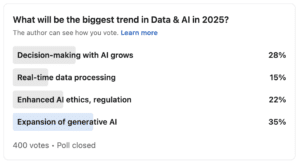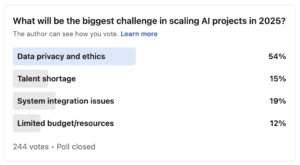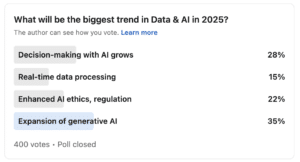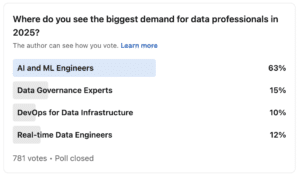2024 was a landmark year for artificial intelligence (AI), with generative AI moving from novelty to necessity. Companies that once explored AI in small-scale pilots now have it embedded in their daily operations. According to McKinsey’s State of AI report, 55% of companies adopted AI in at least one business function, up from 50% the previous year.
From its growing role in the industry to the increased focus on AI governance, human-AI collaboration, real-time data processing, and the surging demand for AI talent, these five trends are shaping everything from hiring strategies to operational frameworks.
Here’s what you need to know.
Trend #1: Generative AI Will Rewire Key Industries
If one AI trend could define 2025, it’s generative AI. From healthcare diagnostics to creative marketing, generative AI’s vast reach is growing fast.
35% of Harnham’s poll respondents identified “Expansion of Generative AI” as the most transformative shift for 2025.
- Healthcare: Generative AI accelerates drug discovery by creating potential molecular structures in hours, not months. It’s also enhancing AI-powered image diagnostics, giving healthcare providers faster, more accurate insights.
- Marketing & Advertising: Marketing teams use tools like DALL-E and Copy.ai to generate content on demand. This enables hyper-personalized ad campaigns at a fraction of the cost and time.
- Customer Experience: AI chatbots powered by large language models (LLMs) now deliver 24/7 personalized support, raising customer service expectations industry-wide.
This generative AI adoption surge is driving demand for niche roles like Prompt Engineers, Machine Learning Specialists, and AI Trainers. These professionals ensure AI outputs are accurate, ethical, and business-relevant.
Trend #2: Ethical AI and Governance
Governments in the U.S. and EU are rolling out AI regulatory frameworks modeled after the GDPR, placing new obligations on businesses to prove their AI systems are fair, explainable, and bias-free.
54% of Harnham’s survey respondents identified data privacy and ethics as the biggest challenge for scaling AI in 2025.
- Healthcare: Mismanaged AI can lead to misdiagnosis or flawed treatment recommendations. The healthcare sector faces some of the highest ethical scrutiny due to the stakes involved in patient outcomes.
- Finance: AI systems used for credit scoring and loan approvals face increased pressure to prove fairness and avoid discriminatory practices. U.S. regulators are already proposing stricter oversight for AI-based lending decisions.
- Legal Services: According to the National Law Review, AI in legal services is set to transform contract analysis, case predictions, and legal research in 2025.
This trend is already reshaping the job market, with companies actively hiring AI Compliance Officers, Data Governance Specialists, and AI Ethics Advisors. These key roles are essential for designing and auditing AI systems to ensure accountability, fairness, and regulatory compliance.
Trend #3: AI-Augmented Decision-Making
For the past few years, people feared AI would replace jobs. But in 2025, it’s clear that the goal is not replacement but augmentation. AI systems will work alongside people, enabling faster and more informed decision-making.
28% of Harnham’s poll respondents believe AI-driven decision-making will be the most impactful shift in 2025.
Industry Shifts in Motion
- Legal Services: AI systems now review contracts faster than human lawyers, but human oversight is still essential for complex cases.
- HR & Recruitment: Applicant tracking systems (ATS) powered by AI speed up hiring decisions, but human recruiters still conduct final interviews.
- Finance: Investment analysts use AI to generate forecasts, but the final call on investment strategy still requires human judgment.
Companies are now hiring for hybrid roles like AI-Augmented Analysts and Decision Support Engineers. These professionals bridge the gap between AI insights and human context. Companies reconfiguring their workflows to support human-AI collaboration will achieve higher productivity and smarter decision-making.
Trend #4: Real-Time AI Will Demand Faster Business Responses
Forget batch processing. In 2025, speed will define success. Real-time AI processing allows companies to analyze data as it arrives, enabling instant reactions to customer demands, supply chain changes, and security threats.
We asked our network which industry would feel the most significant impact of Data & AI advancements, and the numbers spoke volumes.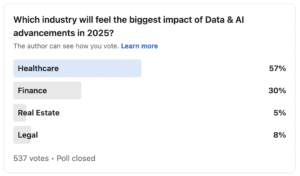
57% of Harnham’s poll respondents believe the Healthcare industry will experience a defining transformation for 2025.
- Customer Service: Real-time AI chatbots offer live customer support, reducing response times.
- Supply Chain: Predictive logistics models automatically reroute shipments to avoid delays caused by weather or supplier issues.
- Fraud Detection: AI fraud detection systems can flag fraudulent transactions as they happen, blocking payments before they’re processed.
As demand for real-time AI systems grows, so does the need for roles like Real-Time Data Engineers and AI Streaming Architects. These roles ensure that AI systems run continuously, processing data streams with no downtime.
Trend #5: Skyrocketing Demand for AI Talent
If there’s one consistent challenge in AI, it’s the shortage of talent. Demand for LLM Engineers, MLOps Engineers, and Generative AI Specialists will outstrip supply in 2025. Companies that want to stay ahead must act fast to secure top talent, especially in sectors like healthcare, finance, and manufacturing.
63% of Harnham’s poll respondents identified AI and EL Engineers as having the biggest demand for data professionals in 2025.
- Healthcare: Machine learning specialists are supporting AI-driven healthcare diagnostics.
- Finance: LLM engineers are enabling AI forecasting in financial markets.
- Manufacturing: AI specialists work on generative AI for design, prototyping and parts manufacturing.
Companies will need to recruit fast and offer competitive compensation packages. Hybrid roles like AI Product Managers (who align AI development with business strategy) will see high demand. Businesses that wait too long to act will face delays in hiring, slowing down their AI initiatives.
What Comes Next for Companies in 2025
Businesses face stricter regulatory scrutiny, rising customer expectations for real-time service, and a fierce battle for AI talent.
If there’s one takeaway for 2025, it’s this: the companies that act now will have the advantage. The decisions you make in the next 12 months on hiring, governance, upskilling, and system design could determine your competitive position for the next decade.
Here’s a final checklist of actions for forward-thinking businesses:
- Upskill existing teams to reduce dependency on an over-competitive AI talent market.
- Expand hiring beyond traditional pipelines to access global and non-traditional talent sources.
- Build internal AI governance capabilities before regulatory deadlines force reactive measures.
- Design tech stacks for real-time AI to ensure speed and responsiveness.
- Develop hybrid workflows where human-AI collaboration is a core operating principle.
Every company says they want to be ahead of the curve, but the real leaders are the ones who make the first move.
Don’t wait for 2025 to start your strategy — the time to act is now.
Explore Harnham’s Data & AI talent solutions here.
Speak to a Harnham recruitment expert here.


























